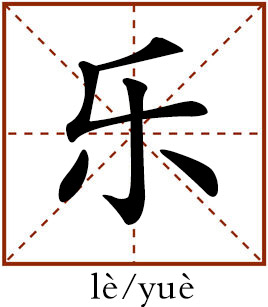music

This character has two tones, lè and yuè. When it is pronounced as lè, it has a meaning of joy, pleasure or happiness. When pronounced as yuè, it refers to music. When used as an adjective, it has a sense of ease and happiness. The double meanings of the character refer to a unique link between music and happiness.
先天下之忧而忧,后天下之乐而乐
xiān tiān xià zhī yōu ér yōu, hòu tiān xià zhī lè ér lè
Xian refers to “ahead” while tian xia, which has a literal meaning of “(all the things) beneath the sky,” usually refers to the country or people. You, which means “worried,” is an antonym of le, or “pleased.” This term has been a well-known saying that has inspired the Chinese people for a thousand years, indicating that one should be the first to worry for the future of the state and the last to claim his share of happiness.
This term originated from a poem by one of the most prominent scholars in ancient China, Fan Zhongyan (989–1052). In the poem, “Yueyang Pavilion,” Fan wrote that, “when such men are high in the government or at court, their first concern is for the people; when they retire to distant streams and lakes, their first concern is for their sovereign. Thus they worry both when in office and when in retirement. When, then, can they enjoy themselves in life? No doubt they are concerned before anyone else and enjoy themselves only after everyone else finds enjoyment. Surely these are the men in whose footsteps I should follow!” (Translated by Yang Xianyi and Gladys B. Tayler) These words reflect Fan’s ambition of helping his country and serving his emperor. They suggest that a leader should plan and worry more than the people, and enjoy the fruits of success only after the people have. Fan’s words reveal his Confucian attitude that emphasizes the significance of common citizens in the state. He suggested that superior men should consider what’s at stake for the country and its people, not purely the benefits. Today, this term is also used to encourage people to work hard and strive for the positive future of the state.
